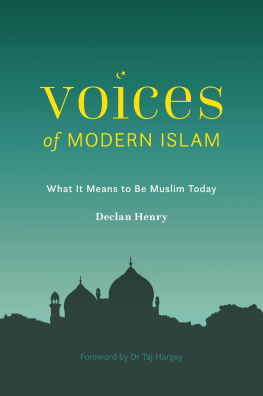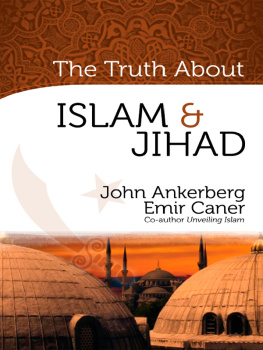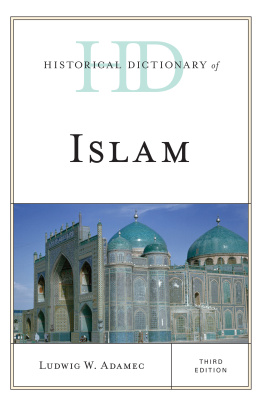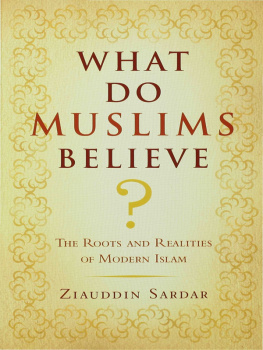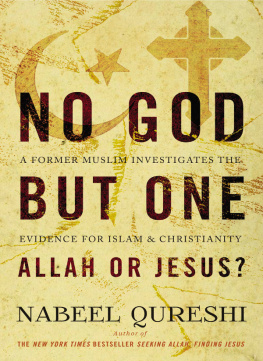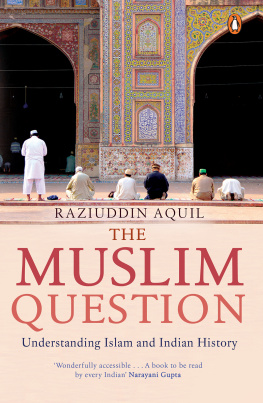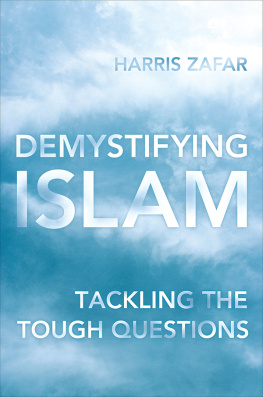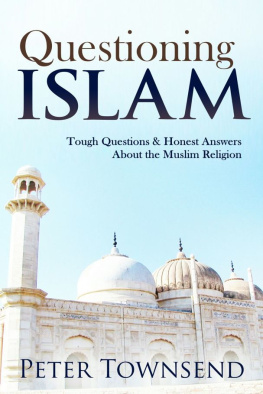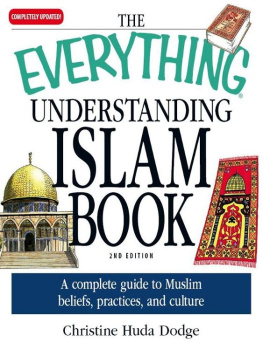Professor Azim Nanji was born in Nairobi, Kenya, and was educated at Makerere University in Uganda and McGill University, Canada. He has taught and lectured widely and was Professor and Chair of the Depatment of Religion at the University of Florida from 1988 to 1998. Since then he has been the Director of he Institute of Ismaili Studies in London. He has authored, co-authored and edited several works including The Historical Atlas of Islam (with Malise Ruthven) (2004), The Muslim Almanac (1996) and Mapping Islamic Studies (1997). In 2008 he will take up an appointment in the Abbasi Program in Islamic Studies at Stanford University.
Razia Nanji was born in Kampala, Uganda and educated at Makere, McGill and he University of Western Ontario. A librarian, she has served as a specialist in Reference and Public Services at the University of Florida.
The Penguin Dictionary of
ISLAM
Azim Nanji
with Razia Nanji

PENGUIN BOOKS
For our parents
PENGUIN BOOKS
Published by the Penguin Group
Penguin Books Ltd, 80 Strand, London WC2R 0RL , England
Penguin Group (USA) Inc., 375 Hudson Street, New York, New York 10014, USA
Penguin Group (Canada), 90 Eglinton Avenue East, Suite 700, Toronto, Ontario, Canada M4P 2Y3
(a division of Pearson Penguin Canada Inc.)
Penguin Ireland, 25 St Stephens Green, Dublin 2, Ireland (a division of Penguin Books Ltd)
Penguin Group (Australia), 250 Camberwell Road, Camberwell, Victoria 3124, Australia
(a division of Pearson Australia Group Pty Ltd)
Penguin Books India Pvt Ltd, 11 Community Centre, Panchsheel Park, New Delhi 110 017, India
Penguin Group (NZ), 67 Apollo Drive, Rosedale, North Shore 0632, New Zealand
(a division of Pearson New Zealand Ltd)
Penguin Books (South Africa) (Pty) Ltd, 24 Sturdee Avenue, Rosebank, Johannesburg 2196, South Africa
Penguin Books Ltd, Registered Offices: 80 Strand, London WC2R 0RL , England
www.penguin.com
First published 2008
1
Copyright Azim Nanji, 2008
All rights reserved
The moral right of the author has been asserted
Except in the United States of America, this book is sold subject to the condition that it shall not, by way of trade or otherwise, be lent, re-sold, hired out, or otherwise circulated without the publishers prior consent in any form of binding or cover other than that in which it is published and without a similar condition including this condition being imposed on the subsequent purchaser
978-0-14-192086-3
Contents
Introduction
The village of Likoni, where I grew up, sits by the sea looking out at the Indian Ocean channel that forms the entrance to the modern Kenyan port of Mombasa, on the eastern coast of Africa.
Like hundreds of such settlements dotted along trade routes that crossed oceans and lands, Likoni was both rooted in the culture of the soil where it grew and at the same time open to influences and peoples that plied their trade along the coast. The people of the Swahili coast, of which Likoni and Mombasa are a part, came into contact with Muslims from the Arabian coast as early as the eighth century. Architectural remains of places of prayer and of small settlements reveal this early contact and its growing influence upon the indigenous people of the region. When Ibn Battuta, the famous fourteenth-century traveller, arrived in the region he found small but thriving Muslim communities that had emerged following contact with peoples of African, Arab and Asian origin.
It is this cosmopolitanism that defined my experience of growing up as a Muslim. We spoke Swahili, the common language that linked the population, as well as our own respective mother tongues, and were becoming increasingly acquainted through English with the heritage of the West and its modern forms of knowledge and education. Mosques, jamat khanas , temples, churches as well as traditional African places of gathering shared this cosmopolitan space.
It is, of course, easy to idealize childhood, but this strong memory of a triple heritage, and the relationships and friendships it offered, remain for me the central elements of a Muslim upbringing: acceptance of diversity, tolerance for pluralism and a strong respect for the autonomy of each religious community but with enough permeability to enable us to find commonalities within this shared space.
These memories jostle now with a retrospective sense of differences between religious groups and lurking racial divides, but rather than retreat into separatism and unthinking parochialism, our Muslim education fostered mutual acceptance and openness. The daily assembly held in our schools included readings from the scriptures of many faiths, and in the classroom Muslims sat alongside Hindus, Sikhs, Zoroastrians and Christians.
In historical terms, this was not an exceptional experience. Muslims in the past often lived and interacted in cosmopolitan worlds, whether in Andalusia, Central Asia, India or the Mediterranean. It is often forgotten that the heritage of classical antiquity, of Aristotle, Galen, Plato and Socrates, is also the heritage of Muslims, who translated, interpreted and further developed their writings, which in their Latin form became the inheritance of pre-Renaissance Europe. During the Convivencia of Andalusia, which began in the eighth century, Muslims, Jews and Christians lived in peaceful coexistence for almost 800 years before wars and the Spanish Inquisition put an end to such cultural tolerance and understanding for centuries.
The academic career I have chosen has led me to explore how major religious and cultural traditions travel across time and space. Over the centuries the followers of many religions have engaged in conflict, seeking often to dominate if not to erase others. However, in its finer moments, religion has transcended difference and forged creativity through art, architecture, literature and philosophy a shared language that enhances the greater human landscape. In our time, it can be argued that to rekindle such a spirit has become a matter of urgent necessity. Muslims, and those among whom they live, find themselves awkwardly placed within a world that perceives Muslims and others to be caught up in a clash of civilizations, and so has formed a generalized and homogenized theological image of both the religion and the diverse histories of those who practise it. Militant groups, often led by equally militant leaders, have gained prominence and visibility beyond that warranted by their numbers or influence. In many cases they are simply bent on conflict and deluded by nostalgia for a non-existent past. The threats and alienations they perceive may be partially rooted in the conditions of our time, as well as the accelerated pace of change and globalization, but by promoting violence and wilful self-destruction they have alienated most of the world, including the majority of their fellow Muslims who are increasingly distancing themselves from this minority. In part this stems from the realization that, historically, Muslim society thrives when it is committed and open to knowledge and able to maintain a balance between different communities of interpretation and struggles when it becomes narrow and rigid, such as when one particularly assertive faction has sought to impose its views and practices to the exclusion of all others.
Most Muslims live in what is called the developing world, many in some of its poorest countries. The inheritance of the nation-state, following a long and turbulent period of European rule and the subsequent Cold War, seriously disrupted the development of many of these societies and dramatically affected their quality of life. The search for state boundaries, workable forms of governance and sustainable economic development presents major challenges, particularly when the colonial legacy includes bitter territorial divisions and recriminations, as in the Middle East, Kashmir and parts of the former Soviet Union and former Yugoslavia. Poverty, war and lack of security have also led to the displacement of populations. Refugees as well as migrants have sought to leave their ancestral homelands for new homes in the West. Their unfamiliarity with societies informed by secular traditions has often compounded the difficulties of adaptation and integration into new and starkly different cultural and social environments. Such issues cannot be viewed simply through a theological lens that erroneously focuses on some congenital deficiency among Muslims which prevents them from taking their place in the modern world.


